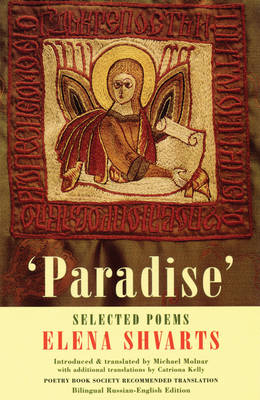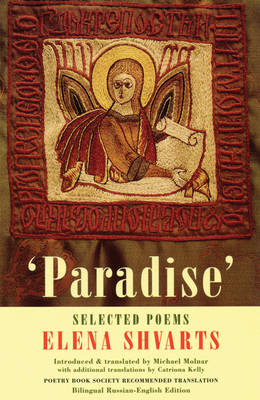
Door een staking bij bpost kan je online bestelling op dit moment iets langer onderweg zijn dan voorzien. Dringend iets nodig? Onze winkels ontvangen jou met open armen!
- Afhalen na 1 uur in een winkel met voorraad
- Gratis thuislevering in België vanaf € 30
- Ruim aanbod met 7 miljoen producten
Door een staking bij bpost kan je online bestelling op dit moment iets langer onderweg zijn dan voorzien. Dringend iets nodig? Onze winkels ontvangen jou met open armen!
- Afhalen na 1 uur in een winkel met voorraad
- Gratis thuislevering in België vanaf € 30
- Ruim aanbod met 7 miljoen producten
Zoeken
Omschrijving
Elena Shvarts was the most outstanding Russian poet of her generation. 'Paradise' presents a dual language selection of her earlier poetry, and was a Poetry Book Society Recommended Translation. Each new generation has to reinterpret St Petersburg, the place, the culture and its significance for Russia. Shvarts's haunted and demonic city is nearer Dostoyevsky's than Akhmatova's or Brodsky's. Her poetry draws backwoods Russian folklore with its cruelty, its religiosity and its quaint humour, into stone, cosmopolitan Petropolis. She brings out both the truth and the irony of Peter the Great's 'Paradise', celebrating and reviling her native city as a crossroads of dimensions, a reality riddled with mythical monuments and religious symbols. Despite the blood beneath its pavements, her St Petersburg also reveals traces of an angelic origin: 'Black rats nest over the shining river, in undergrowth, / They're permitted, welcome, nothing can ruin paradise on earth.' Elena Shvarts stood outside all schools and movements in contemporary Russian poetry. She once famously described poetry as a 'dance without legs'. Her own poetry fits this description perfectly, a combination of deeply rhythmic and lyrical dance with the eccentric, perpetual movement of flight. The world of her poems is strange and grotesque; often the setting is urban, but unrecognisable - towns emptied of the everyday and peopled only by animals, spirits and strange elemental forces. A peculiar religious fervour illuminates these scenes, but her religion is unorthodox and highly individual. Shvarts's poetry is visionary. Her vision takes her to the edge of language and rhythm, and she was one of the few contemporary poets brave enough to trust her vision absolutely.
Specificaties
Betrokkenen
- Auteur(s):
- Uitgeverij:
Inhoud
- Aantal bladzijden:
- 146
- Taal:
- Engels
Eigenschappen
- Productcode (EAN):
- 9781852242497
- Verschijningsdatum:
- 27/01/1993
- Uitvoering:
- Paperback
- Formaat:
- Trade paperback (VS)
- Afmetingen:
- 140 mm x 216 mm
- Gewicht:
- 195 g

Alleen bij Standaard Boekhandel
+ 52 punten op je klantenkaart van Standaard Boekhandel
Beoordelingen
We publiceren alleen reviews die voldoen aan de voorwaarden voor reviews. Bekijk onze voorwaarden voor reviews.











